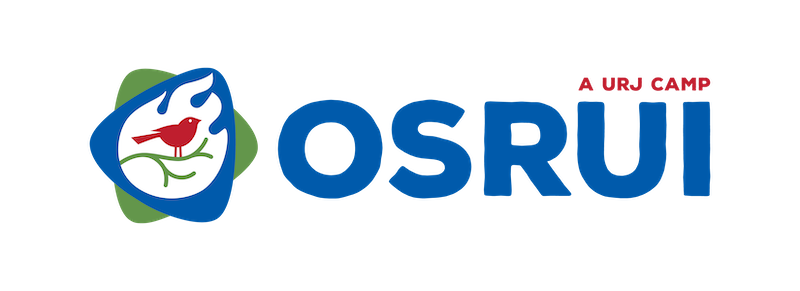By Rabbi Lisa Greene, Rabbi at North Shore Congregation Israel in Glencoe, IL and Moshavah Segel
Not your burning question on awakening this morning? I understand. But, I would imagine that some might ask this, on learning that I returned from a 4-day long canoe trip with OSRUI’s Moshava unit. For while I am indeed a water-loving, former-lifeguarding adult, I’m no pro at canoeing or camping. And while it’s always great to have more hands on a camp tiyul (trip), one could argue that there were already 4 competent counselors accompanying the 17 young teenagers heading out onto the Wisconsin River Monday afternoon. But still, there I was, heading out onto the river with this group, excited and a bit nervous, the lifeguard/mom combination ever cautious with kids and water.
For four days we canoed on the Wisconsin River, covering some 45 miles. Each night we camped on a sand bar, with an exquisite view of the water and tree line, with our campers learning quickly how to set up tents and find good ways to relieve themselves in the wilderness. We carried our ingredients and prepared our meals, cooking dinner each night, tasty vegetarian dishes, with campers helping to cut up vegetables for dishes quickly devoured. And we carried our water and the rest of our gear in our canoes.
 Each morning we got up, packed our tents, ate breakfast and loaded gear into our canoes. We would find out our paddling partners for the day, and, before we set off, I told a story or shared an inspirational text, and we joined in the morning prayer Modeh Ani., expressing gratitude that we are awakening and alive.
Each morning we got up, packed our tents, ate breakfast and loaded gear into our canoes. We would find out our paddling partners for the day, and, before we set off, I told a story or shared an inspirational text, and we joined in the morning prayer Modeh Ani., expressing gratitude that we are awakening and alive.
Each day we paddled and floated, stopped for lunch, sang, called out conversations and watched the terrain and water level change. When we found a good campsite around dinnertime, we would unpack, group gear first, and give the campers time to run around, explore and play.
Each evening before bed, we joined in Shema and Hashkiveinu, our bedtime prayers – or, on the last night we created our own ritual for the mystical practice of Kiddush Levanah, the sanctification of the new moon. Kiddush Levanah is a not-so-well-known ritual that is to take place in the first half of the month, when the moon is waxing, affirming the potential for renewal.
The tiyul went off without a hitch, the chanichim (campers) enjoying, learning and creating a community within their Moshava community, the madrichim (counselors) leading with warmth, strength and good limits for their precious cargo. As for me, the roles varied, from the general “part-of-the-group” type to those one might call rabbinic:
- Pass out blessing cards to madrich and chanich, with some of the many blessing of our tradition, with the hope that they would find and create sacred moments on the journey.
- Launch our canoes at the outset, in Sauk City, Wisconsin, with Tefilat Haderech, our Jewish travelers’ prayer.
- Learn to cook for 22 people on a Coleman stove.
- Engage in conversation canoe partners who were either very quiet or utterly energetic.
- Partner with campers to create sacred moments of ritual each evening.
- Point out eagles, turtles and fish along the river – and encourage campers to join in a blessing for wonders of nature “Baruch Atah Adonai…oseh ma’aseh v’reishit.” In other words, encourage all involved to step back with awe, or, in the words of Abraham Joshua Heschel, radical amazement.
- Remind young teenagers to don their hats and sunblock and drink water. (I am still a parent, even if these are not my children.)
- Answer questions about being a rabbi – and, perhaps, throughout the trip show our campers a real-life model of rabbi as person – a rabbi no less who was as un-showered, sand-covered, and dirty as they themselves were.
And, throughout, I tried to encourage our travelers to consider the difference between a traveler and a tourist, a distinction set up the prior week as we read at the end of the book of Numbers of our Israelite ancestors’ journeys. This distinction is one of perspective and goals, and openness to the opportunities for learning and growth before us. Certainly these Mosh campers can now at least articulate that a tourist goes from stop to stop to stop, and a traveler goes with the flow and looks at the larger picture of the journey and what is to be gained from the experience. Though, if I had to bet, I’d say that these campers internalized this teaching, too, as we journeyed with the flow of the Wisconsin River this week.
